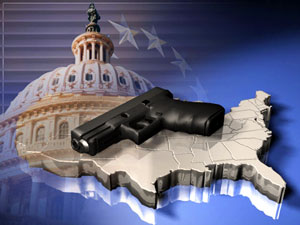WASHINGTON (FinalCall.com) – As violence increases between the Mexican drug cartels and the Mexican Army just south of the border, an anti-gun violence group says firearms used by the drug cartels are largely bought in the United States.

“Because we make it too easy for dangerous people to get dangerous weapons, our lack of effective, common sense gun laws is helping to create a regional security risk and costing Mexican citizens their lives,” said Paul Helmke, president of the Brady Center to Prevent Gun Violence. “There are distinct and unarguable shortcomings in our gun laws that are now causing terrible problems not only in our country but also in our hemisphere.”
It is difficult to purchase guns in Mexico because the gun laws in Mexico, like those in most industrialized nations, do not allow a vast unregulated gun market, in which military-style weapons and all manner of guns are easily available for purchase in unlimited quantities and without background checks, the group said.
Confronted with Mexico’s tough gun laws, the drug lords and the traffickers who supply them come to the U.S. to take advantage of U.S. gun laws’ gaping loopholes, the group added.
The Brady Center’s new report, “America’s Weak Gun Laws are Fueling the Violence in Mexico … and in the U.S.,” details how easy it is to buy guns in the U.S.
According to the report, “Federal law allows guns to be sold by unlicensed sellers without Brady background checks. ATF has found that ‘no background check’ sales are a major source for supplying dangerous people with guns. Investigations of gun shows have found that unlicensed sellers have trafficked thousands of guns without background checks, making them the second-most prominent source of illegal gun trafficking.”
“Mexican drug cartels are exploiting this loophole, buying guns in ‘no background check’ sales at gun shows or other private venues,” the report said.
The federal Drug Enforcement Administration sees things differently. “The reason you see the escalation in violence is because U.S. and Mexican law enforcement are winning,” Garrison Courtney, a DEA spokesman, told reporters March 10. “You are going to see the drug traffickers push back because we are breaking their back. It’s reasonable to assume they are going to try to fight to stay relevant.”
If this is true, Mexico’s success is causing major problems for the United States’ border cities.
The National Drug Intelligence Center wrote in their 2009 National Drug Threat Assessment that Mexican cartels are crossing into the United States where “they control most of the U.S. drug market and have established varied transportation routes, advanced communications capabilities and strong affiliations with gangs in the United States.”
According to the Brady Center, easy access to guns offered state side fuels the problem. “In response to the Mexican crisis, legislation has been introduced to expand resources for ATF to crack down on firearms trafficking across the border, and U.S. Attorney General Eric Holder has called for reinstatement of an assault weapons ban. While these proposals are positive steps, they alone will not be sufficient to stem the gun crisis in Mexico, or in the United States.”
“While we respond to the gun violence crisis in Mexico, we should also respond to the gun violence crisis here at home. The United States suffers more than 30,000 deaths and more than 70,000 injuries due to gun violence every year,” the report noted. “By strengthening our federal gun laws, we can start preventing criminals in Mexico and the U.S. from acquiring guns.”












